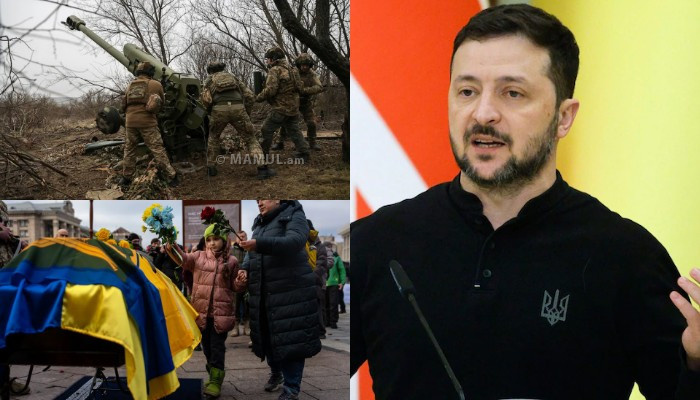Ukraine warns Trump that early peace talks would be catastrophic
 Forcing Ukraine to negotiate with Russia before it regains the advantage on the battlefield would be a catastrophic mistake, officials in Kyiv have warned ahead of Donald Trump’s inauguration. Fearing that the new US administration could reduce military aid if he refuses talks, Volodymyr Zelensky is scrambling to make the case that Ukraine first needs time and support to escalate its campaign deep inside Russia. A failure to make Vladimir Putin “feel pain” before negotiating would would embolden the Russian president, weaken Ukraine and ultimately damage the West’s reputation and interests, according to Mr Zelensky’s aides. Eager for a rapid replication of the ceasefire between Israel and Hamas, Mr Trump repeatedly promised on the campaign trail that he would end the war between Russia and Ukraine within 24 hours. While the incoming president’s team concedes that will not happen, Keith Kellogg, the retired general who is Mr Trump’s Ukraine envoy, has given himself 100 days to bring the conflict to a close. Such self-imposed deadlines have caused deep concern in Kyiv, the Ukrainian capital, where officials warn that rushing into talks would simply play into Putin’s hands. “The bottom line is that there are no simple, quick decisions to be made here,” says Mykhailo Podolyak, a senior adviser to Mr Zelensky. “The initiative has to be controlled. It must not be given away to Russia.” Although Russia is advancing slowly but steadily, notably by gaining ground around the important logistics hub of Pokrovsk, Ukrainian officials say they are making important headway far beyond the front lines. In the past week, Ukraine has carried out some of its biggest strikes on Russian territory yet. Using homemade drones, US-supplied Atacms and Storm Shadow missiles provided by Britain. Ukraine struck multiple targets in four Russian regions, hitting oil facilities, industrial plants and military production sites more than 700 miles from the border. The attacks are having a significant impact on the Russian economy, Putin’s greatest vulnerability, and it is vital that Ukraine is given support to compel the Kremlin to enter negotiations from necessity rather than choice, Mr Podolyak said. “At the moment, 46 per cent of the Russian refinery sector is under attack or within range of Ukrainian weaponry,” he added. “This means that Russia is gradually losing a large part of this key sector of its economy. “In addition we are also hitting key military infrastructure across the European region of Russia. “We need to be able to keep up this kind of pressure if we are to enter negotiations from a position of strength. Only if Russia is suffering losses will it be willing to negotiate meaningfully.” After a year of strikes on Russian oil refineries and energy infrastructure, Ukraine has stepped up attacks after receiving permission from Britain and the US to use their missiles against targets inside Russia. Meanwhile, Ukraine has increased domestic drone manufacturing, with record production levels expected in 2025. In theory, targeting Russian refineries, which cost tens of billions of pounds, is effective because energy is the mainstay of the country’s economy. It is unclear how much damage Ukraine has inflicted, as Russia has classified most of its oil production data. Last month a Ukrainian drone attack forced Russia to shut down the primary oil refining units at the Novoshakhtinsk processing plant, its largest, for the third time in a year. Meanwhile, Russia’s seaborne fuel shipments fell 9 per cent in 2024, suggesting the attacks have forced Russia to cut down on exports and shore up its domestic capacity. However, a Ukrainian intelligence source said Russia has mostly been able to repair oil facilities “within a week” and only additional Western missiles, coupled with more robust energy sanctions, would force Putin to recalculate. It is doubtful that Ukraine’s pleas will have much traction with the new US administration. In a much-read report he co-wrote in April last year, Gen Kellogg argued that the prospect of a Ukrainian military victory over Russia had evaporated and there was little possibility of recovering lost territory. Claiming that the US was heedlessly drawing down a stockpile of advanced weaponry that might be needed if China invaded Ukraine, he maintained that continuing to arm Ukraine amounted to “expensive virtue-signalling”. Future American military aid, he insisted, would “require Ukraine to participate in peace talks with Russia”. If such talk has contributed to a feeling of bleakness in Ukraine, Mr Zelensky’s government is doing its best to put on a brave face. |

Trump on peace talks: 'I hope Ukraine moves quickly' (video)
9813:43
US homeland security orders pause of DV1 Visa program
16111:19
Ukraine hasn’t yet agreed with USA on Donbas, Zaporizhia NPP, and funding issues – Zelenskyy
17610:29
Russia is preparing for contacts with the United States on Ukraine, the Kremlin says
281Yesterday, 16:39
Zelensky: Ukraine delegation heads to US
291Yesterday, 14:28
Venezuela’s Maduro says Trump's comments on land and oil reveal his true motives
329Yesterday, 12:18
